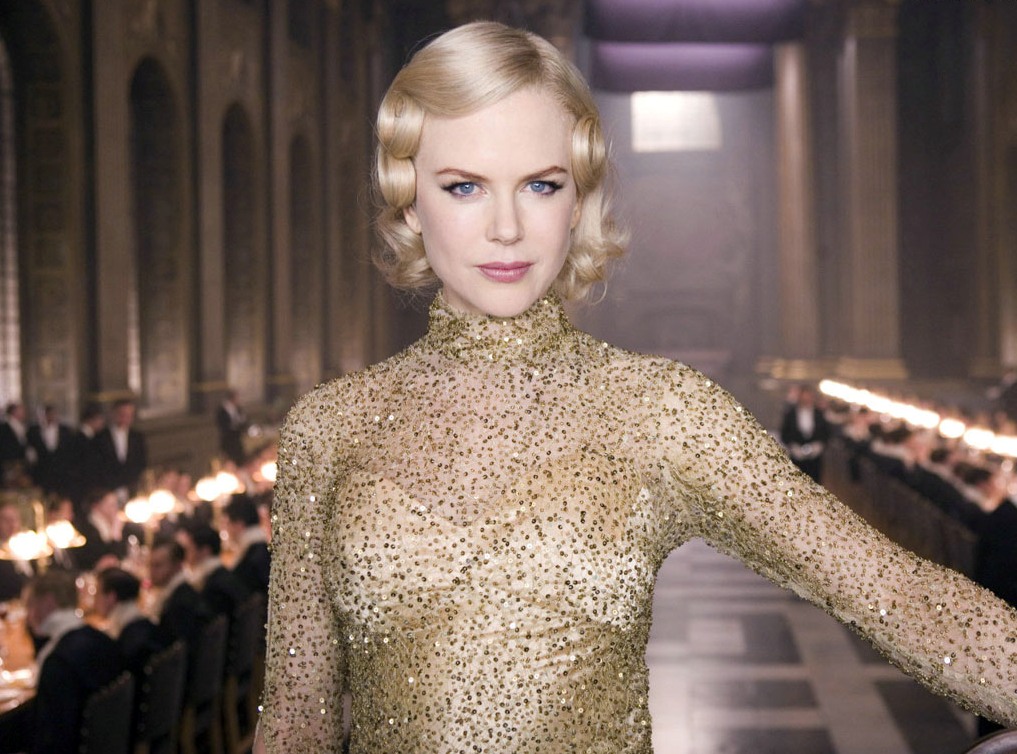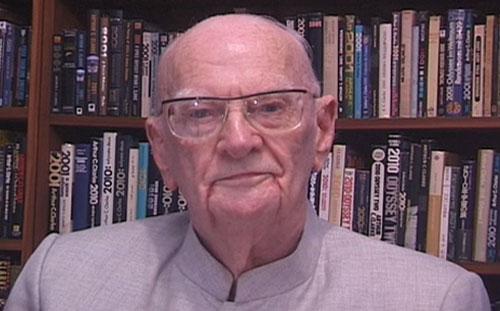Robert Asprin, author of the Myth Adventures and Phule’s Company series and a staple of my early fantasy reading, 1946-2008. (By way of Return of the Reluctant.)
Tag: Sci-Fi/Fantasy Books
No New Tale to Tell.
As I noted of The Lion, the Witch, and the Wardrobe back in 2005, I could take or leave the Narnia books as a child, even despite my inordinate fondness for Tolkien. I liked LWW well enough, but as the “Famous Five“-style adventure of that book yielded more to high fantasy, and particularly as the lion became more overtly arch-Christian in the later tomes, I pretty much tuned out of the series, and if I read the last few books, I don’t remember them at all. So it was that I ventured into Andrew Adamson’s The Chronicles of Narnia: Prince Caspian yesterday evening out a sense of fanboy dutifulness more than anything else. (Also, I’m not sure what it says of summer movie culture that this is the third review in three weeks that I’ve had to preface with an explanation of my relationship to the kid-oriented source material.)
In any event, dutiful is a good way to sum up Prince Caspian. It’s a competently-made fantasy-war film, and it hits all the beats I remember — In fact, unlike PJ’s LotR, the best parts of the film may be the deviations from the book. But I found the overall experience somewhat lackluster and prosaic, and I had the vague sense throughout of being forced to watch a high-end BBC production of an acclaimed children’s fantasy novel in school somewhere. To be honest, I’m not entirely sure if that’s due to Adamson’s film or Lewis’ tome. Either way, unless you’re considerably more fond of the Narnia books than I (or are looking to prosletize to children) I’d probably skip it. Caspian isn’t a bad film per se — it just feels like a hollow one.
Prince Caspian begins with an eclipse, a birthing, a midnight assassination attempt, and a Ford of Bruinen-style horse race, all of which suggest that we’ve moved pretty far afield from the twee satyrs and beavers of the last Narnia outing into more Elizabethan fare. The target of said attempt is one Prince Caspian (Ben Barnes), the rightful heir to the Telmarine throne, who’s now been forced out of the picture by his uncle, Lord Miraz (Sergio Castellitto)…but not before being given a magical horn from the ancient days of yore. After being accosted by dwarves (Peter Dinklage, Warwick Davis), Caspian toots his own horn and, lo, we’re back with the Pevensie children — Peter, Susan, Edmund, and Lucy — in wartime London, one year after the events of LWW. The horn’s spell soon shuttles the four back to Narnia (a good thing, since they seem to be having trouble adjusting to the real world)…but now it’s 1300 years after their last visit, the land has grown more savage, and the Narnians are all but extinct, thanks to the depredations of the Spaniards, uh, Telmarines. And so it falls upon the Pevensies to come to the aid of Caspian, and to try to make things right in their former kingdom. But where is Aslan? Only Lucy (Georgie Henley), the youngest, believes He still might around to help, here in this darkest hour of Narnia. But, who’s everyone else gonna believe? Lucy or their lion eyes?
What ensues, give or take some alpha-male grandstanding between Peter (William Moseley) and Caspian — and goo-goo-eyes made between Caspian and Susan (Anna Popplewell) — is basically a two-hour fantasy-war film: In other words, this is the Two Towers of the bunch, with sieges, cavalry, trebuchets, the whole nine. And, while it’s interesting to see how much Tolkien shared with and/or borrowed from his fellow Inkling — we have the dispossessed king of Men, a variation on the Ents, and the aforementioned Ford here — it’s hard not to get the impression that medieval fantasy-wars are a bit played out in cinema at the moment. Aside from a stealthy incursion upon the Telmarine fortress, one that ends rather horribly (and includes a minotaur pulling a Gan), there’s a lot of been-there, done-that to the proceedings here. And, despite the valiant efforts of Peter Dinklage (making a solid case that del Toro’s Hobbit might do well to take a page from Time Bandits when to comes to Thorin Oakenshield’s band), the cast from the rather-bland Caspian on down is mostly unmemorable, particularly compared to James McAvoy, Ray Winstone, et al from LWW. (And Eddie Izzard’s turn as a mouseketeer, basically Shrek‘s Puss-in-Boots spliced with the Ratatouille gang, reinforces the unfortunate sense that Caspian has mostly been beaten to the punch, film-wise.)
One of the best sequences in the film is a surprise appearance by Tilda Swinton’s White Witch (one apparently added by Adamson), which not only helps round out Edmund (Skandar Keynes)’s story arc from the first film but, for a few minutes, brings both personality and a real sense of menace to the tale. Otherwise, alas, Prince Caspian is mostly a lot of medieval grunting, centaurs and satyrs cheering, and we the audience waiting around for the inevitable leonis-ex-machina. O Lion, why has thou forsaken us?
Notes from the Underground.
In today’s trailer bin, Atonement‘s Saiorse Ronan must save her own post-apocalyptic Zion in the new teaser for Gil Kenan’s City of Ember, from the children’s book by Jeanne Duprau (which I’m not at all familiar with). I’m not quite sold by this trailer, but an eclectic bunch is coming along for the ride: Bill Murray, Tim Robbins, Harry Treadaway, Martin Landau, Marianne Jean-Baptiste, Toby Jones and Mary Kay Place.
The Caspian Siege.
We’re an action movie, honest! The new trailer for The Chronicles of Narnia: Prince Caspian is now online. I’ll admit to having no real connection to the Narnia books (other than the first one). Still, this looks like little more than two hours of WETA-enhanced air conditioning to me.
Childhood’s End.
Rewriting the Legend.
As y’all might remember, I quite liked I am Legend last year, despite the fact that it pretty much falls apart in the last half-hour or so. (It still made #18 on the 2007 list.) Well, fwiw, the original ending to the film is now online, and it’s definitely more Matheson-esque (and sidesteps the goofy New England Utopia at the end, although I guess it is still implied.) Worth a look, if you saw I am Legend in the theater.
The Sleeper Awakens…Again.
Having tackled The Kingdom, director Peter Berg sets his sights on another tale of political bloodsport surrounding a priceless resource in the desert: another film version of Frank Herbert’s Dune. “Calling the plans for him to direct ‘a done deal,’ Berg said ‘if it weren’t for the writer’s strike, we’d be in it right now’ and calls the film’s scale ‘big big big.’” Let’s just hope the spice hasn’t gone to his head.
Legend of the Fall.
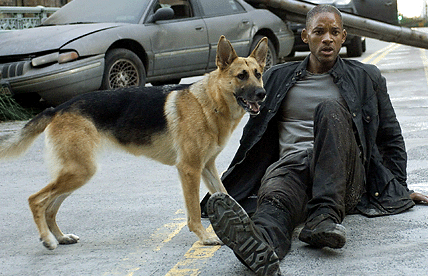
In Francis Lawrence’s I am Legend, Will Smith wanders the streets of New York City, his only companion his trusty, loyal, and free-spirited canine sidekick. To stave off the despair and dementia that lurks behind interminable loneliness, he dotes on his dog and immerses himself in routine: He watches as many movies as possible, indulges in his music collection, broadcasts his continued existence into the ether, and throws himself into his work, a solitary investigation marked by repetition and feelings of futility, one whose fruits he knows will more than likely go unused and unread. To all of this, I say: Who the hell wants to sit through a movie about the last year and change of grad school? And couldn’t they find a sheltie to play l’il Berk? (As for yours truly, I’d have gone Philip Seymour Hoffman or Paul Bettany — maybe Michael Cera for the flashbacks — but, hey, Will Smith works too.)
Seriously, though, when I first heard word they were doing another take on Richard Matheson’s eerie 1954 novella, and that word was penned by hackmeister Akiva Goldsman and read “We’re blowing up the Brooklyn Bridge!“, I figured this would be a big budget stinker, along the lines of Alex Proyas’ version of I, Robot. And yet, while a action blockbuster has been grafted onto the basic story (and it’s moved from suburban California to the heart of Metropolis), Francis Lawrence’s I am Legend is surprisingly true to the grim feel of the novella. In short, Legend is a much quieter and more melancholy film than I ever expected. And, while it definitely has some problems, it’s probably my favorite big budget blockbuster of the year, with the possible exception of The Bourne Ultimatum. True, Lawrence’s take on Constantine in 2005 turned out better than I figured as well. Still, I’m actually quite surprised by how moody and haunting this film turned out to be. (And, give credit where it’s due. Like Paul Haggis and In the Valley of Elah, I’m forced to concede that Goldsman might not always be the kiss of death.)
I am Legend begins innocuously enough with a sports report — It looks like the Yankees and Cubs in the World Series, although LA has an outside shot at a pennant too. But, in the near future, it ain’t just the ball players injecting experimental serums anymore. As a doctor (Emma Thompson) on the news informs us, scientists have altered the measles to work as the ultimate body-cleansing virus, in effect working as a cure for cancer. (A Cure for Cancer! This follows the baseball scores?) Cut to New York City, three years later. Round the decay of that colossal wreck, nothing beside remains…except one man (Will Smith) and his dog (Abbey), chasing down a herd of deer through the empty steel corridors of a desiccated Manhattan. (Sorta like Llewellyn Moss in No Country for Old Men, except now that country is everywhere, and the deermeat is worth more than the bag of money.) Clearly, something has gone Horribly Wrong. As we come to discover, that heralded cure backfired in dismal fashion, killing 90% of the Earth’s population immediately and turning the rest, a la the rage virus in 28 Days and 28 Weeks Later, into violent, depraved monsters with a taste for blood and a susceptibility to sunlight. This Last Man on Earth is one Robert Neville, an army scientist (blessedly immune to the disease) who spends his days in a Jamesian manse on Washington Square, working on a cure to beat back the infection, and his nights just trying to stay alive. (Put simply, “scientific atrocity, he’s the survivor.”) But, even with Samantha, his German shepherd, by his side, the loneliness and omnipresent danger are taking their toll. And as he succumbs deeper into hopelessness — and the creatures show signs of learning — his coping strategies begin to shift. Forget the cure…Maybe it’s time just to chase these Crazy Baldheads out of town…
Now, as I said, I am Legend does have it share of problems. The movie becomes more of a conventional actioner as it moves along, and the last act in particular feels weaker than the rest of the film. Looking exactly like the cave-dwellers in Neil Marshall’s The Descent, the CGI creatures have an ill-favored and badly-rendered look, and the more you see of them the less scary they become. Also, in complete counterpoint to what Dr. Neville tells us about the infecteds’ “social deevolution,” they eventually seem to get behind a Lurtz/Solomon Grundy of sorts. But his presence or authority is never really explained — he’s just a tacked-on Big Bad. I had trouble believing that somebody could’ve heard of Damien Marley but not his father Bob. (And, since you’re seemingly geared to the teeth, Dr. Neville, may I make some suggestions? 1) Infrared scope. 2) Night-Vision goggles.)
All that being said, for most of I am Legend‘s run it’s a surprisingly rich and nuanced film. Will Smith is invariably an appealing presence, but he doesn’t rely on his easy charisma or “Aw, hell no!” bluster much here. His performance is tinged with melancholy, and he does some great work in some really awful moments. Also, I feared going in that the canine companion bit would come across as a gimmick, just a cute creature for Smith to bounce off expository monologues. But Sam isn’t just Wilson the Volleyball — she’s a living, breathing character of her own. (Nor is she Lassie — she doesn’t seem preternaturally smart, and occasionally does dumb dog things, which seemed all too realistic.) And then there’s New York after the Fall, which in itself is a sort of character in the film. In shot after shot (somewhat akin to, but less showy than, the opening Times Square sequence of Vanilla Sky), Lawrence captures the eeriness of this great city laid low. Other than the aforementioned Brooklyn Bridge, “Ground Zero,” as Neville now calls it, hasn’t been destroyed or ravaged. It’s just empty, an overgrown, city-sized echo chamber for his pangs of isolation. (And as the Marley song goes, “It hurts to be alone.”) But, hey, even in a desolate New York City, with vampires lurking in the dark places, there are still plenty of fun ways to pass the time, and particularly if you have a good dog by your side.
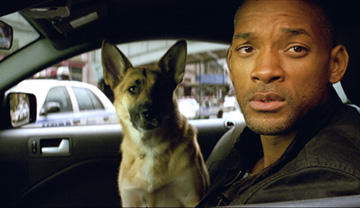
Ink-Stained Wretches.
As seen in front of The Golden Compass, Brendan Fraser and daughter (Eliza Bennett — no, not that one) accidentally unleash the evil of Andy Serkis upon the world in the new trailer for Iain Softley’s Inkheart, from the fantasy novel by Cornelia Funke. Even I’m getting fantasy fatigue at this point, particularly given what New Line just wrought with Compass. Still, this one does have a fun cast: Also along for the ride are Paul Bettany, Helen Mirren, Jim Broadbent, and Jamie Foreman.
Stripped Bear.
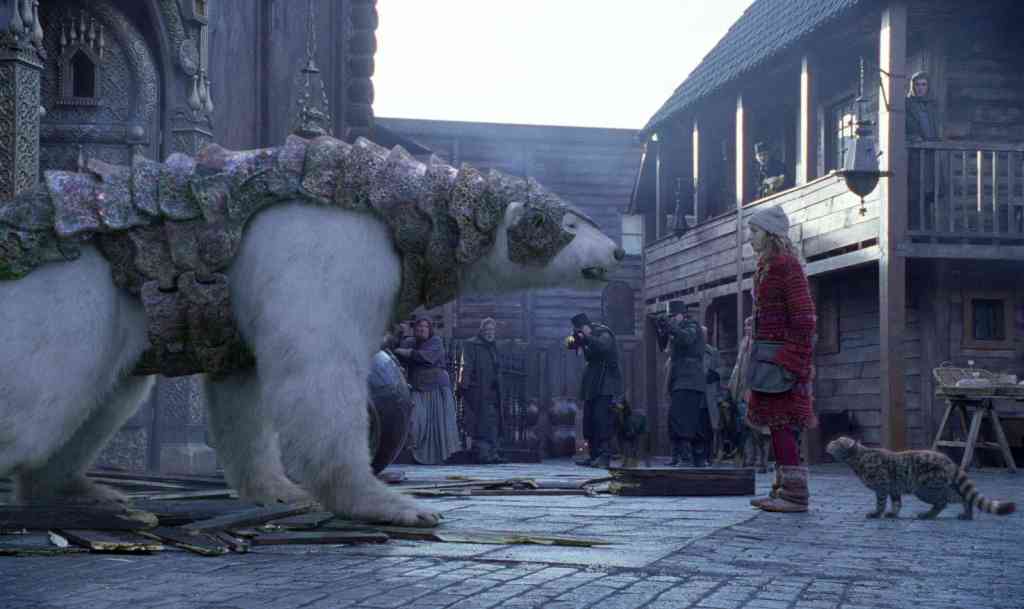
“If you was to crack it open, you’d find no living thing in there. No animal nor insect at any rate. There’s a clockwork running in there, and pinned to the spring of it, there’s a bad spirit with a spell through its heart.” So the mentorly Gyptian scholar Farder Coram (Tom Courtenay) tells young Lyra Belacqua (Dakota Blue Richards) of a robotic wasp that’s tracked her down, at the behest of the villainous Mrs. Coulter (Nicole Kidman). Alas, the same could be said of Chris Weitz’s disappointing version of Philip Pullman’s The Golden Compass. The film looks nice enough, but it’s ultimately a plodding and mechanical take on Pullman’s fantasy, one missing its own inner daemon, if you will. And the mischievous, anarchic spirit that drives Pullman’s story has been so thoroughly confined in Hollywood drek and by-the-(Box-Office)-numbers banality that it barely resonates at all.
I was rooting for Weitz here: I quite enjoyed About a Boy and In Good Company (which he produced), and thought his leaving the film for awhile suggested he was aware of the epic scope the project required. And, while Pullman can be a stunningly self-inflated and ungracious sort, I thought the first book of His Dark Materials, before the trilogy bogged down in its own self-importance and anti-religious fervor, was a particularly good fantasy yarn. Alas, the movie as presented — I get the sense we may see another cut of it someday — does Pullman and Compass a severe disservice. All the subversiveness has been drained away from the story, and what we’re left with is virtually indistiguishable from any other B-level Rings clone. It’ll probably just be remembered the one with the polar bears.
Compass establishes its debt to Peter Jackson’s Rings films early — Like The Fellowship of the Ring, Compass begins with a “world as we know it” establishing prologue, setting up the conceits, the McGuffin, the good guys and bad guys, before keying in on one happy-go-lucky youngster who’s the focus of our story. The child in question is one Lyra Belacqua (Richards, good with what she’s given, and she avoids the cute-kid trap very well), an orphan living at Jordan College (i.e. the alternate-dimension version of Oxford). Lyra spends her days frolicing with the town children and getting into trouble with her daemon Pantalamion (Freddy Highmore) — In this world, you see, every person has their own animal-spirit companion which reflects their nature, following them around, sharing their pleasure and pain, and offering advice and conversation as needed. (This is quite different from our world, where my animal companion spends his days chasing his tail, barking at evil, and passing out on the couch.)
But Lyra’s world is about to come undone: Her free-thinking uncle, Lord Asriel (Daniel Craig, also quite good given the circumstances), has upset the ruling order of the Magisterium (Think the Vatican, except with Simon McBurney, Derek Jacobi, and Christopher Lee in tow) by arguing not only that parallel worlds exist, but that they might be accessible through the omnipresent interstellar medium known as Dust. And, when Asriel — now that the whole world looks Dusted — decides to continue his research in the polar North, Lyra herself gets caught up in the great events, particularly after an undercover agent of the Magisterium, one Mrs. Coulter (Kidman, seeming somewhat lost — she was better in Margot last week), takes a shine to her, and it is determined Lyra can read an ancient and powerful device known as an alethiometer, which invariably speaks truth to power. Is Lyra that child, the one prophesied to come by the witches of the North? Well, definitely maybe…
There are some elements of The Golden Compass that work rather well. As I said, Richards is an appealing presence, and it’s hard to imagine a better Lyra than her. Daniel Craig and especially Sam Elliot, as the aeronaut-cowboy Lee Scoresby, breathe much-needed life into the story in their brief moments onscreen. The daemons are for the most part cleverly handled, with particular plaudits for Mrs. Coulter’s vicious golden monkey (It really seems like it leapt off the page.) And most of the polar bear sequences, featuring Ian McKellen as the deposed bear-king Iorek Byrnison and Ian McShane as the evil usurper of the throne, Ragnar Sturlusson, are as good as one could hope for.
But McKellen’s inherently Gandalfian qualities further cement a comparison which doesn’t work in Compass‘s favor. If anything, Weitz’s film proves how important composer Howard Shore (like production designer Alan Lee) was to the success of the Rings trilogy. In Compass, as in Rings, characters are prone to describe places they’ve arrived at with a burst of description and a musical flourish. (“Svalbard, kingdom of the ice bears!“) But Alexandre Desplat’s score is so leaden and overbearing that it makes these bouts of exposition seem like, well, exposition. As a result, there’s much less magic in Compass than there should be — Like Chris Columbus’ first two installments of the Harry Potter series, Weitz’s film at best feels like a book on tape.
Or does it? Daemons and polar bears aside, the thing that made Compass an interesting read was Pullman’s subversive intent. In fact, I’ll admit to being more than a little curious as to how the heck The Subtle Knife and especially The Amber Spyglass, with its overtly Miltonic war against “the Authority” (i.e. God), was ever going to translate into a Christmas blockbuster. The answer the studio suits came up with, it seems, was to disembowel the film almost completely. Perhaps, given his haughty disdain for other authors’ fantasy works, Pullman even deserved to see his Golden Compass turned into an eviscerated Disney ride — Polar bears without the Coke. But fans of the book sure didn’t. Somewhere, somehow, somebody at New Line clearly decided that Compass needed to be more upbeat if it was going to make any money.
As a result, the ending of the movie, which cuts off a few chapters early (despite scenes of the Northern Lights in the trailer), was such a flagrant sucker-punch to the audience that I left completely disgusted with the film. If you’d never read The Golden Compass, you’d be hard-pressed to follow what’s going on anyway, or to give the overarching story the benefit of the doubt when it’s so often drowning in exposition. If you have read The Golden Compass, then you know how it ends, or will remember as it goes along, and don’t expect to see anything different. But, no, in keeping with its resolute ambition throughout not to offend anyone, Compass is (currently) given a syrupy, platitudinous ending before Lyra et al reach the Crack in the World. It’d be as if the Coens transformed the end of No Country for Old Men, or Joe Wright his new version of Ian McEwan’s Atonement, just to make it feel more upbeat and “viewer-friendly” and thus improve the box office. (In fact, if anything, it reminded me of the disrepect George Sluizer showed his audience with the feel-good American version of The Vanishing, which recently came up over at THND.) I was on the fence, leaning negative, about The Golden Compass up to that point. But those closing moments encapsulate most of what’s wrong with this saccharine adaptation. Say what you will about Philip Pullman — He’s definitely more fun with claws.
